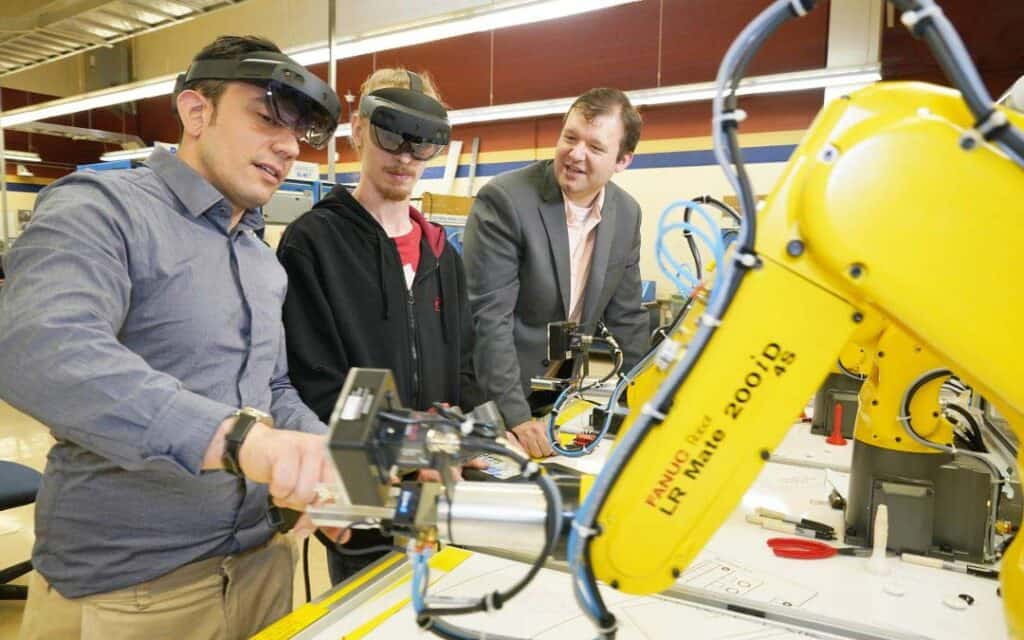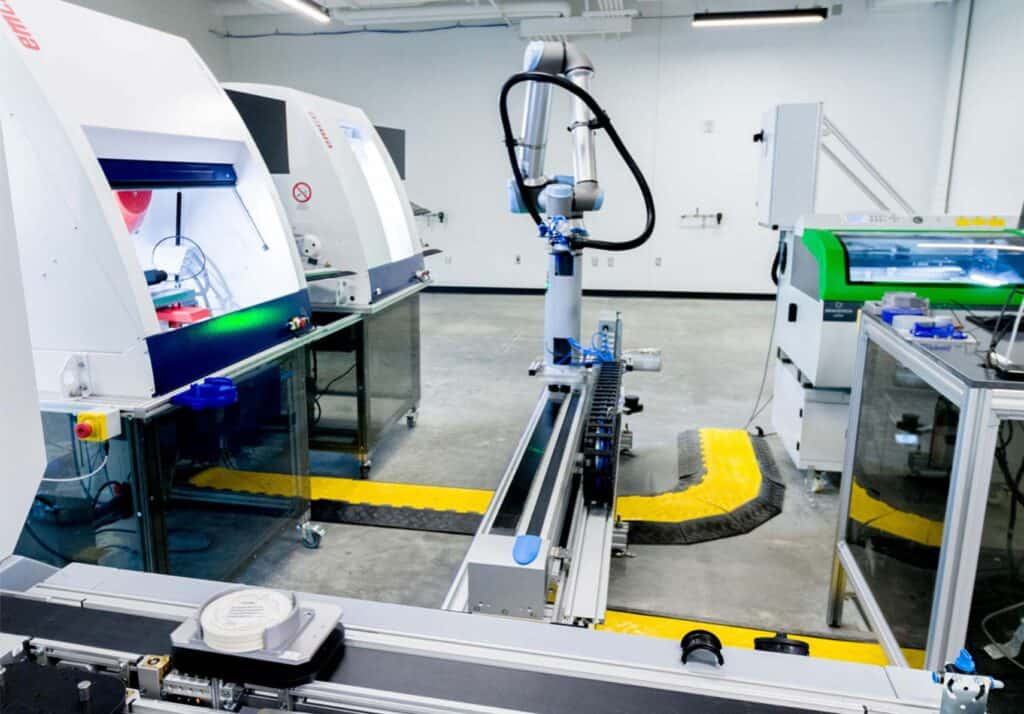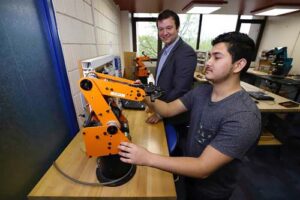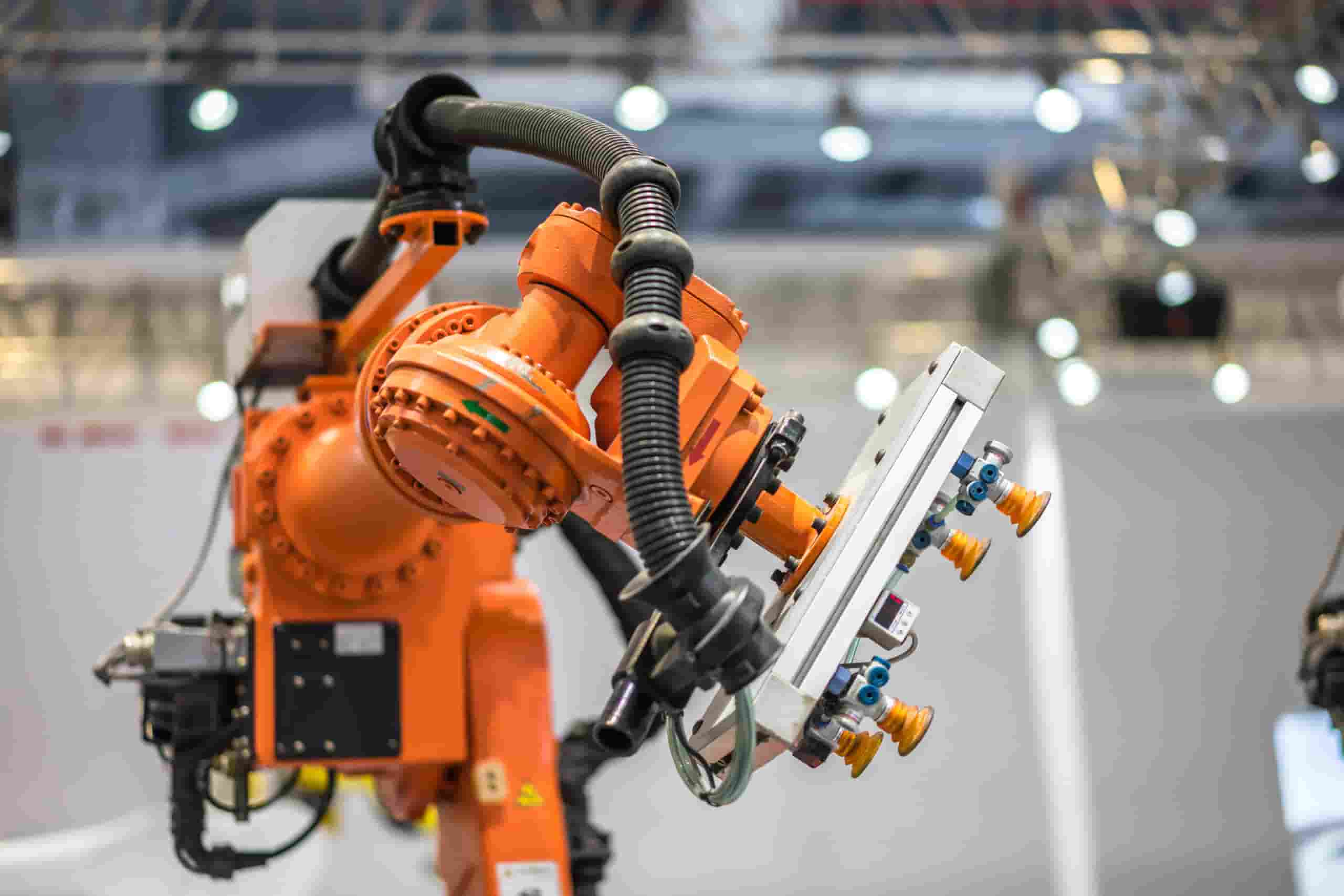
In this month’s five questions feature, we chat with Justin Starr, Endowed Professor of Advanced Technology at ARM Member Community College of Allegheny County (CCAC)! Justin initially began his academia journey at CCAC before taking on leadership roles in the robotics industry. Through his experience as the Chief Technology Officer at RedZone Robotics, Justin gained firsthand knowledge of the skills that students and workers were missing for robotics careers, which prepared him to make real, impactful changes to robotics education after RedZone was sold.
Clearly the insights and expertise that Justin brings to CCAC are effective – CCAC is an ARM Institute Endorsed training program on RoboticsCareer.org, meaning that CCAC has been evaluated by robotics industry subject matter experts and is proven to give students the skills they need for a robotics career in manufacturing. Justin was one of the primary contacts for CCAC as they underwent the ARM Endorsement process.
Get to know Justin in the interview below!
1. We like to start our interview by exploring our expert’s career journey. Can you tell us a bit about your background, how you became interested in robotics and manufacturing, and about your role the Community College of Allegheny County (CCAC)?
I never intended to go into academia. Between 2015-1018, I was the CTO of RedZone Robotics, a manufacturer of wastewater inspection robots. I loved my work at RedZone and we had a suite of incredible products, including the world’s first autonomous sewer inspection platform. We had no trouble hiring engineers from Pittsburgh’s world-class universities, but we always struggled to find robotics technicians. It was so challenging to find people who could assemble, repair and actually work with custom PCBs, fiber optic cables, and our in-house software.
When we sold RedZone, I had the opportunity to make a career change. Because I started my academic journey at the Community College of Allegheny County (CCAC), I knew how important community colleges were for both students at the local economy. When I was offered a teaching position, I knew I would have a real opportunity to create an academic program that would produce the technicians I so badly wanted to hire.
As the Endowed Professor of Advanced Technology, I work to integrate cutting edge technology into CCAC’s academic and career programs. Our advanced manufacturing program now includes courses that cover smart sensors, the internet of things and collaborative robotics. We’ve integrated artificial intelligence fundamentals into a number of skilled trades apprenticeship programs, recognizing that today’s graduates are likely to work closely with autonomous systems. Our students have sent an experiment to the International Space Station for two years in a row, and were recently selected for a third mission.
I love teaching at CCAC. I’ve had a unique opportunity to work across multiple divisions within the college to help faculty and staff embrace cutting edge technology. I’ve heard from so many local manufacturers about how newly hired CCAC graduates have exceeded their expectations, and I hope to continue this work for years to come.
2. We are incredibly impressed by CCAC’s new $43M Center for Education, Innovation and Training. For those who aren’t aware of this facility, can you tell us more about it and specifically how it’s building a skilled manufacturing workforce? Additionally, are there ways that industry partners can get involved in the facility?
Our new Center for Education, innovation and Training (CEIT) is where the college has focused on implementing several programs that target high priority occupations, including advanced manufacturing, culinary arts and cybersecurity. Our advanced manufacturing facility includes several state-of-the-art labs that expose students to the actual equipment used in industry.
The approach to CEIT was unusual from an academic perspective. CCAC worked closely with industry partners to develop a comprehensive understanding of the needs in the local economy. These partners formed a Business and Industry Leadership Team (BILT) that actually defined the Knowledge, Skills and Abilities (KSAs) our graduates needed to have. At CCAC, we then worked backwards to develop a curriculum that met the needs of industry and purchased equipment to match.

Our advanced manufacturing facilities include a fabrication lab, where students can use 3D printers, CNC equipment and laser engravers to produce a variety of parts. Our training classrooms use modular portable trainers that are contained in Pelican cases, so that we can easily move equipment. This has allowed us to run robotics training programs onsite with industry partners and in local K12 classrooms.
Our main labs include a cyber-physical factory that includes two automated guided vehicles, two CNC machines, a cobot on a 7th axis configured for machine tending, an automated storage and retrieval system, a laser engraver, and a smart conveyor system. It is controlled by a manufacturing execution system (MES) and allows students to engage in low volume manufacturing. Students can produce coasters, chess pieces and other small parts, and program the entire system from order creation to delivery. This allows them to learn about the economic and management aspects of advanced manufacturing in addition to pure technology.
We also have a robotics lab featuring robots from both FANUC and cobots from Universal Robots. CCAC is a UR Approved Training Center and is able to offer UR Core Training programs onsite in our facility. We utilize more than 7 cobots to accomplish this, ranging from the small UR3e to the large UR20e, currently configured as a palletizer. When local companies purchase UR robots, they can complete the included training at CCAC.
One thing I’ve found to be particularly interesting about CCAC’s investment in cobots is that small to midsized businesses responded very favorably. We know of more than 7 local companies that have made the decision to buy their first cobot based on exposure to these units at CCAC. Typically, these small to midsized manufacturers believed that they would not be able to benefit from automation, but our “living laboratory” has provided tangible evidence of how easy it is to install these systems.
3. For this question, we’d like to draw on your expertise and best practices that you and CCAC have developed. What do you consider to be the number issue impacting robotics education for manufacturing and what is CCAC doing to address this issue?

The biggest challenge we notice is that many educators allow technology to drive decision making. Purchasing a new robotic system can be an effective way to spend grant funding, but what good is a system if it is not used by students. At CCAC, we have found that it is essential to work closely with industry to drive curriculum, and purchase technology as a response to that process. Many vendors at educational trade shows can show case really sexy advanced manufacturing systems, but how well these systems work to meet industry needs is an open question.
We also see a certification “arms-race” beginning, where programs are adopting industry certifications for the sake of having industry certifications – again, failing to think about how local partners actually engage with these credentials. At CCAC, when were planning our new CEIT, we found that industry partners worried about hand skills of graduates. As a result, we revamped our certifications to focus on credentials that required lab work, so that we could verify a student’s practical skills in addition to theoretical knowledge.
To us, it doesn’t make sense to have certifications that can only be completed online – how would a graduate who has only taken online courses respond to his or her first day in a real manufacturing facility? That isn’t fair to the student or the employer. Yet, we see many other schools adopting dozens of online and remote certifications in order to attract students. This will ultimately lead to a trust issue with industry partners.
It is also crucial to broaden access to advanced manufacturing if we want to close the skill gap in southwestern Pennsylvania. CCAC is working with community partners to broaden access to manufacturing training. We’ve created a “lending library” where K12 schools and community organizations can borrow state of the art equipment in order to bring training directly into communities. Churches, libraries, and classrooms can “check out” electrical systems, mechanical systems and industrial robots for a few weeks in order to provide onsite training. CCAC trains community leaders, and all of this is available at no cost.
4. CCAC is an ARM Institute Endorsed training program, meaning that your program is proven to give students the skills they need for a robotics career in manufacturing. Can you tell us about the Endorsement process and what value you’ve found in being an ARM Endorsed training program?
The ARM Endorsement process was fantastic for CCAC. As an instructor and program coordinator, it is always difficult to put your vision for a program into a broader context. As part of the endorsement process, CCAC’s curriculum was reviewed by external robotics professionals who were able to provide essential feedback and recommendations to strengthen our efforts. We were one of the first community colleges in the country to go through the endorsement process and we wouldn’t hesitate to do it again.
While CCAC is known for its training programs throughout the Pittsburgh region, we’ve found that the ARM endorsement process has connected the college with students from well outside of our service area. Recently, several prospects from Jefferson County, Ohio, who are no longer served by a community college, reached out to CCAC to apply to our mechatronics program. We’ve even had potential students reach out from Germany and other countries in Europe. All of these individuals mentioned that they found CCAC through ARM, so we have found significant value in the endorsement.
5. You recently participated in our 8th Annual Member Meeting in Pittsburgh. What value did you find in participating in our event? Were there any major takeaways that you’d like to let our readers know about?
It is always nice to get together with like minded individuals, and the ARM Member Meeting is unique in that respect. I sometimes feel like it is a high school reunion, in that I bump into so many robotics professionals who I haven’t seen in months or years at the event. The discussions are always worthwhile, and every year CCAC leaves the event with new connections to industry.
I find that many companies aren’t sure exactly how they should go about engaging with their local community college: they don’t know where to start, who to talk to or what kind of programs are possible. At the Member Meeting, CCAC has an opportunity to share collaboration tips and tricks with representatives from companies, and we always leave the event with at least five (5) new relationships. Some companies will come to CCAC for training, some individuals will sign up to be adjunct faculty members, some partners will extend job offers to current students or recent graduates. For those reasons, we never miss an ARM Institute Annual Member Meeting.
6. Bonus Question: Is there anything else that our readers should know about CCAC and any upcoming initiatives that you’d like to highlight?
While the CEIT Building on our Allegheny Campus is an exciting place to learn about robotics and advanced manufacturing, CCAC also opened our Innovation Accelerator / Entrepreneurial Makerspace on our West Hills Campus. This makerspace contains traditional 3D printers, soldering stations, sewing machines, laser engravers, CNC equipment, manual machining supplies, large format printers, vinyl cutters, a metal 3D printer and an electron microscope. The makerspace is open to students, community groups and the general public. Individuals can be trained to operate certain pieces of equipment to complete projects, or can work with makerspace staff to produce and order parts for low volume manufacturing projects. CCAC also offers entrepreneurial training in the space as well to help folks start businesses by understanding the economic side of manufacturing and innovation.
[ARM Institute Note: The CCAC Innovation Accelerator is part of the ARM Institute’s piece of the Pittsburgh region’s Build Back Better Regional Challenge award, which takes place under our Robotics Manufacturing Hub program. Both the Innovation Accelerator and the Robotics Manufacturing Hub help small and medium-sized manufacturers in the Southwestern Pennsylvania region adopt robotics solutions. Learn more about both efforts, including our three other Innovation Accelerators, here.]Join the ARM Institute’s 400+ Member Organization Consortium
Ready to join experts like Justin in building a stronger, more secure future for U.S. manufacturing with us? In collaboration with our member organizations, the ARM Institute leads the way to a future where people and robots work together to respond to our nation’s greatest challenges and to develop and produce the world’s most desired products.
We do this by funding collaborative robotics and artificial intelligence (AI) technology projects that bring together diverse project teams, building workforce solutions (including RoboticsCareer.org and the ARM Institute Endorsement program), enabling networking between competitors and organizations that otherwise may not have had the opportunity to connect, providing services that support manufacturers in adopting robotics solutions, and more.
Explore ARM Institute membership here
Join the ARM Institute mailing list
More About RoboticsCareer.org
RoboticsCareer.org is the nation’s only resource dedicated specifically to supporting students, job seekers, training providers, and employers on their robotics journeys! The ARM Institute built this national resource in collaboration with our 400+ member organizations to address the manufacturing workforce gap. We do this by supporting:
- Prospective Students: Each of the 16,700+ training programs that are listed on RoboticsCareer.org align directly to the skills and competencies we’ve identified as being needed by the manufacturing industry. Using RoboticsCareer.org, students can understand these skills, explore job previews, and connect to the training program that will best meet their goals. Through the ARM Institute Endorsement program, students can easily identify training programs that are proven to give them the skills they need for a future-proof robotics career.
- Job Seekers: The thousands of jobs listed and updated bi-weekly on RoboticsCareer.org also align directly with the ARM Institute’s defined career pathways. Job seekers can create an account on RoboticsCareer.org to get personalized job recommendations sent directly to their inbox and can opt into being contacted by hiring employers who are using the RoboticsCareer.org talent database.
- Training Providers: Training providers can list their robotics manufacturing training programs on RoboticsCareer.org for free. Additionally, training providers receive free leads from RoboticsCareer.org when a prospective student opts to contact the program. Through the ARM Institute Endorsement Program, programs can elevate their visibility on the platform, as Endorsed programs receive priority listing, inclusion in blog posts, and their content is optimized for greater search engine exposure.
- Manufacturers and Employers: Around 8,000 users visit RoboticsCareer.org each month with thousands creating an account on the platform. Hiring employers and manufacturers can create an account and use RoboticsCareer.org to find qualified workers through the platform’s talent database and by posting your jobs directly. Using our talent database, you can find individuals with the exact robotics skills that you need, see which candidates have graduated from an ARM Institute Endorsed training program, understand if individuals have applied their skills in a professional setting, and contact the individual directly. Not sure where to start? Leverage pre-built job descriptions that use the ARM Institute’s robotics career pathways as a foundation.
It all starts with your profile on RoboticsCareer.org! Create your free account via the link below or email us at [email protected] for assistance.
Build your profile here
ABOUT THE ARM INSTITUTE
The Advanced Robotics for Manufacturing (ARM) Institute is a Manufacturing Innovation Institute (MII) funded by the Office of the Secretary of Defense under Agreement Number W911NF-17-3-0004 and is part of the Manufacturing USA® network. The ARM Institute leverages a unique, robust, and diverse ecosystem of 400+ consortium members and partners across industry, academia, and government to make robotics, autonomy, and artificial intelligence more accessible to U.S. manufacturers large and small, train and empower the manufacturing workforce, strengthen our economy and global competitiveness, and elevate national security and resilience. Based in Pittsburgh, PA since 2017, with a satellite office in St. Petersburg, FL, the ARM Institute is leading the way to a future where people & robots work together to respond to our nation’s greatest challenges and to produce the world’s most desired products. For more information, visit www.arminstitute.org and follow the ARM Institute on LinkedIn and X (formerly Twitter).
